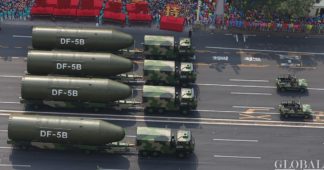By Ryan Fedasiuk
August 2020
The world is watching how the Chinese military develops and deploys artificial intelligence—but how exactly will it apply AI? This policy brief analyzes Chinese experts’ arguments about AI and prospective warfighting capabilities, identifying prevailing concerns about strategic stability and unintended escalation.
For all the attention given to how the U.S. military should plan for great power competition with China—and the role of artificial intelligence in that competition—U.S. observers have spent far less time discussing Chinese perspectives of the same. English-language studies that do focus on the role of AI in China’s military outlook have rightly focused on the corpus of high-ranking military leaders’ statements and official PLA planning and policy documents. But high-level strategic plans are poor indicators of AI development in practice, and risk criticism that public statements from Beijing should be dismissed as “cheap talk.”1
A supplementary approach to understand the Chinese military’s thinking on AI is to read what People’s Liberation Army (PLA) officers, defense industry engineers, and academics involved in the day-to-day development and deployment of AI are writing about the technology.
This study constructs a framework for systematically assessing arguments about AI’s effect on military capabilities and strategic stability. It applies the framework to 58 journal articles written from 2016–2020 by PLA officers, defense industry engineers, and academics at leading Chinese universities (hereafter “experts”) about artificial intelligence and future weapons systems.
Key findings include the following:
- Chinese experts forecast that AI will improve detection, targeting, and strikes against military targets. They are optimistic about the advantages of machine learning to track or strike at forces and lower the costs of signaling or deploying force—primarily through intelligent munitions, unmanned aerial vehicles, and intelligence, surveillance, and reconnaissance (ISR) software. At the same time, Chinese experts were concerned that a reliance on AI would leave systems vulnerable to adversarial examples, and that cyber vulnerabilities could threaten command and control systems.
- Chinese experts believe advances in AI will undermine strategic stability, both in general and in terms of China’s deterrence relationship with the United States. They most often argued that AI could increase the risk of miscalculation or escalation in conflicts and reduce the ability to retaliate. Chinese experts are particularly concerned that American advances in AI could overwhelm Chinese air defenses, increase the vulnerability of Chinese command and control systems, or reduce China’s time to respond to an imminent attack—mainly as a result of the AI-enabled AGM-158C Long Range Anti-Ship Missile, automated vulnerability detection and exploitation in cyberspace, or decision support and training software.
- Chinese experts tend to overestimate U.S. military AI capabilities, relative to open-source reporting. Chinese discussions of U.S. AI projects resemble Cold War concerns over a “missile gap” between the United States and the Soviet Union. Chinese experts overestimated U.S. capabilities, at times citing outdated or inaccurate projections of U.S. investments and force postures that make use of “intelligentized” weapons (智能化武器).
- Chinese machine learning engineers face significant hurdles in developing and deploying AI applications, including constraints on the technical literacy of service members and the availability of data and computing power. At the same time, they worry that Chinese advancements in AI could proliferate outside the country, and have taken steps to secure information and prevent technology transfer to the United States.
Policy Recommendations
American readers might find comfort in the fact that Chinese experts think U.S. AI capabilities exceed their own. However, many Chinese experts remain concerned that AI developments in either country could undermine strategic stability or risk unintended escalation. An effective U.S. strategy to contain Chinese military AI development should preserve America’s apparent advantages in AI while minimizing the impulse to race toward unpredictable, unproven weapons systems. At the same time, the United States can take steps to mitigate concerns about escalation risks.
- Maintain the U.S. AI advantage by constraining the PLA’s access to data, personnel, and critical advanced semiconductors. This report challenges the notion that the U.S. military lags behind the PLA in a race to adopt AI. Rather, Chinese journal articles in this study indicate that the PLA faces three major obstacles in adopting AI: limited access to data, insufficient security clearances and technical literacy among personnel, and a dearth of high-end microprocessors required to develop and run advanced neural networks. U.S. policymakers would be remiss to ignore the PLA’s struggles. The U.S. government has several tools at its disposal to improve U.S. advantages in data, personnel, and hardware, while restricting the Chinese military’s access to the same.
- Avoid arms racing. Rather than immediately pursue the most promising AI capabilities, U.S. military leaders should carefully consider the costs and benefits of developing certain AI systems—for example, an ISR system designed to autonomously track Chinese road-mobile transporter-erector-launchers.2 It is unclear whether or to what extent China may hold back AI development in response to U.S. restraint. However, Chinese experts frequently point to their capability gap with the United States as justification for accelerating research and investment in AI and intelligent weaponry.
- Mitigate escalation risk. To reduce the risk of miscalculation or inadvertent escalation, the United States must actively coordinate with rival powers.3 Maintaining a stable nuclear future will demand that the United States undertake both confidence-building measures and assertive negotiations with Chinese counterparts. U.S. negotiations with China to proscribe certain autonomous weapons or AI capabilities should remain separate from broader efforts to constrain China’s nuclear arsenal.
Published atcset.georgetown.edu
We remind our readers that publication of articles on our site does not mean that we agree with what is written. Our policy is to publish anything which we consider of interest, so as to assist our readers in forming their opinions. Sometimes we even publish articles with which we totally disagree, since we believe it is important for our readers to be informed on as wide a spectrum of views as possible.











